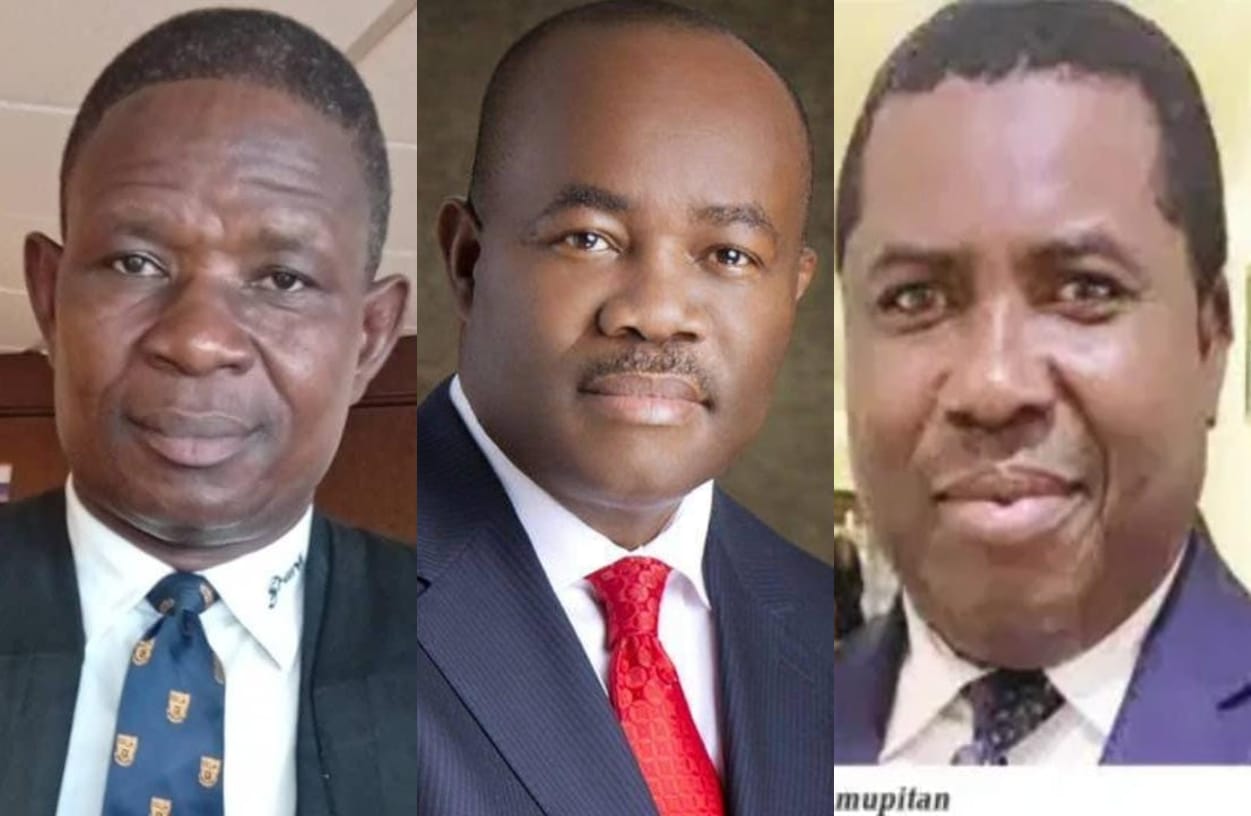A RESPONSE TO THE OPINION “NIGERIAN ASSOCIATION OF LAW TEACHERS AND THE PERSISTENT DISDAIN FOR ITS OWN BUSINESS, OBJECTIVES, AND MANDATE” OF SYLVESTER UDEMEZUE – A CREATIVE DIAGNOSIS OF SELF MANUFACTURED MALADIES
BY BETHEL UZOMA IHUGBA, PhD.
INTRODUCTION
It is obvious that the above opinion was authored from a place of love and altruism with the intent on improving service delivery of NALT. It is however, midwifed by palpable emotion resulting from a milieu of failure surrounding the education system, not just law teaching. After a careful reading of this opinion, I beg to differ 90 percent. This arises from the fact that a misdiagnosis no matter how well intended may cause more harm than the illness it sought to cure. The learned author’s opinion is a well-intended but erroneous diagnosis. This misdiagnosis therefore renders most of the prescriptions unfit.
The learned author set out with the argument that NALT is not meeting its objectives but ended up demonstrating that he has a different set of objectives for NALT. That is like setting a physics exam for your students and scoring them with a biology examination question marking scheme.
The question is whether NALT is meeting its objectives as set out in its Constitution? This is important as the author has also recognised that NALT has a constitutional mandate against which its success or failure should be evaluated. Any other criteria outside these mandates would be arbitrary, unfair and inaccurate. Unfortunately, this is essentially what the author did. I rely solely on the learned author’s list of NALTs constitutional objectives and mandates. He bears the blame for any mis-listing!
I now demonstrate my position below.
NOTE: This is different from whether the current Executive Officers (EXCO) of NALT have met their manifesto. Incidentally, the author did not explicitly make this point but at times conflated NALT with its EXCO. Though understandable, they are still two different entities. In other words, permit me to reiterate that my intervention is to the question raised by the learned author in relation to NALT, not its Executive Officers.
Having established this, let us take the NALT Objectives, as highlighted by the learned author, one after the other and assess whether or not they are “being” met. I choose “being” because we do not expect that it is resolved in one circle but that something significant is being done to meet the objectives.
OBJECTIVE ONE AND TWO: *To Promote Excellence in Law Teaching and Research and to enhance legal education and pedagogy.*
The conference and the opportunity to present papers which it offers, irrespective of topic, is a great opportunity for law teachers to promote excellence in law teaching and research by creating opportunities for participants to learn and teach best practices in legal research and teaching. It is an opportunity for law teachers to assess themselves while participating in the conference as presenters, discussants or audience. It enables them to know where they measure against best practice standards and contemporary discourse. It is an opportunity to know whether there is room for improvement or consolidation and to go ahead to achieve same. At the conference, individuals’ presentations are put to the test before an array of experts in different aspects of law. This means therefore that after a paper has undergone criticism, discussion and questioning, it will be shocking to say that no one learnt anything from the presentation. One must have either learnt a new thing or consolidated existing knowledge thus reassuring one that one is on the right track. If participants did any of these, then the objective of promoting excellence in law teaching and research would have been achieved.
To appreciate this, one should remember that many at times the discussion, including contributions from the discussants to questions and comments from the audience goes beyond the substantive argument in the paper presented to include issues of research methodology and teaching pedagogy. This therefore resolves promoting excellence in law teaching, research and teaching pedagogy.
OBJECTIVE THREE: *to foster academic collaboration among law teachers*
A careful examination of the practice for conducting the research and the presentation of papers at the NALT conference shows that it seeks to foster academic collaboration among law teachers. This can be seen from the practice of the allocation of papers to institutions instead of individuals. Whether law faculties and research institutions are taking advantage of this opportunity is a different issue for which NALT cannot be blamed. Topics are allocated to Faculties so that they go back and set up teams to complete the research. So if this is followed internal collaboration is encouraged. Then the appointment of universities and research institutes as discussants also meets the requirement for inter-faculty/inter-university collaboration. By being discussants, participants have the opportunity to provide further argument of the paper in areas not covered by the lead presenter, critique the paper, highlight its strengths beyond the observation of the lead presenter and suggest areas for improvement. If the observations of the discussants and audience are noted by both audience and lead presenter, knowledge would have been enriched through collaborative efforts. This is collaboration.
Also during the conference, conferees should be able to identify scholars in their areas of interests and develop a collaborative platform. For instance, I remember that at the NALT Conference a few years back, there were attempts to set up cohorts of experts in different areas of law: Constitutional Law, Tax Law etc. I joined constitutional law. Incidentally, things appear to have faded away. This is not NALTs doing. It is that of the individuals in those groups, I included. NALT created the environment and opportunity to foster academic collaboration among law teachers, it is our duty as individual law teachers to sustain it. Not necessarily NALT as an organisation.
NALT Conference is a great opportunity for individual scholars to network with others and co-author papers in reputable journals and carry out impact oriented empirical research in law. This will not be done by NALT or its executive officers but by individual members, the learned author, Sylvester Udemezue, included.
OBJECTIVE FOUR: To engage meaningfully with stakeholders on issues affecting the development, regulation, and quality of legal education in Nigeria
Now this is the area where 90 percent of the learned author’s assessment falls into. Incidentally, this cannot be assessed based on the conference alone. This should be a round the year engagement with necessary stakeholders. More importantly, it should be a year round implementation of extant NALT and Teaching regulations. Incidentally, some of the issues raised have extant laws and regulations which do not require NALT intervention. For instance examination malpractice should not be a role for NALT. It is both a criminal offence and against University regulations. Dissipating NALT energy on it will be committing the crime for which the author is accusing NALT. Brain drain among law teachers is not peculiar to NALT. As far as our shores are less green than the shore ten feet away, brains shall drain. The NALT conference cannot resolve it. This is a job that should be put squarely on the government. Well maybe, NALT will help put it there!
At best the conference can be an opportunity to harvest ideas for resolving pressing issues which are within NALTs mandate and capacity. For example NALT can mandate the EXCO to report progress or otherwise on tasks taken or allocated to them which directly affects all or any of the constitutional mandates of NALT. This can be done during the AGM. The tasks or issues can be drawn from communiques after each session of papers. Not necessarily so, but that is a good opportunity to identify pressing issues.
The question is are there issues peculiar to law teachers on this particular objective no 3 which are not being addressed. Should NALT go it alone? If I should rely on the learned authors list, then I would say that law teachers by participating in ASUU, churning out great scholarly and policy work are already working on meeting this objective. Can NALT do more and better? Yes it can and I will demonstrate below.
SOME WAYS TO DO MORE AND BETTER ON THE OBJECTIVES AND MANDATES
The assessment of NALT as showing *Persistent Disdain for its Own Business, Objectives, and Mandate* is incorrect. While NALT may not score A plus, it is far from showing persistent disdain! One can confidently, at the risk of sounding brazen, score NALT 65%. That is a B! While not an A, it is a recognition of its great achievements so far. Should NALT go for an A plus? Yes, it should and can with additional proactive strategy and hard work. I therefore humbly suggest the following:
1. To further meet its Objective One, NALT must ensure that uniform best practice is maintained in research and teaching. For instance, the NALT Manual on Legal Research, Basic Guide for Law Faculties and Legal Research Institutions in Nigeria (NALT BLUE BOOK) should be aggressively implemented and followed in all law faculties from LLB projects to PhD thesis and Journal publications. Also, law teachers should task themselves to read the guidelines and contact the Monitoring and Implementation Committee (of which I am a member) should areas for improvement be identified. The Committee can also be invited by faculties for sensitisation on the use of the Guideline, how to update the postgraduate school and how apply it within the law faculty etc.
2. The presentation opportunities during the conference should be taken more seriously. Cramming presentations into half the originally allocated time while rushing contributions undermines the process. Serious attempts should be made to follow allotted time and discussants given the opportunity to make their contributions. The same applies to responses from the audience.
3. Participating in the NALT conference as either discussant or lead presenter should be awarded marks, if not already done for promotion within the law faculties. It may also be necessary to introduce sanctions against universities that either fail to make their presentations or fail to appear as discussants. Discussants should be required to make written submissions which should be forwarded to the Conference Committee. We should all take it both as a privilege and duty.
4. The AGM should be an opportunity for NALT through its EXCO to present a progress report on issues tabled before it preceding NALT Conference or issues of direct concern to law teachers that happened within the year. This feedback loop will help put Law teachers in the loop and give law teachers better information to assess NALT performance against its mandates and objectives.
5. To further meet its Objective Three, NALT may explore proactive ways of opening opportunities for its fulfillment. For example, NALT may reassess its practice of allocating topics to universities and change it to listing out themes and allow universities to select themes and develop their own topic. This is more democratic and collaborative. It helps resolve the allegations of not creating space for law teachers’ oriented topics (including on issues of direct concern to law teachers), while avoiding the learned author’s erroneous attempt to impose transient topics on NALT Conference as “priorities”. This is important as the NALT conference is both academic and professional. It will give a better opportunity to contribute both academic and profession specific scholarly papers. This will allow faculties to submit papers that seek to resolve some specific NALT related challenges and from the faculties position of strength.
6. To benefit from this opening of spaces and identify areas to address for the year post the conference, there should be a secretariat for each conference session. The role of the secretariat amongst other things should be to harvest recommendations for possible action by the NALT leadership and identify recurring issues of concern. The practice of developing a communique upon which the EXCO or identified Committees could be mandated to resolve should be introduced.
7. At the AGM, one of the key agenda should be for the NALT leadership to report its success or failure to achieve previous conference resolutions and mandates as contained in the published communique. This will give participants an opportunity to suggest ways for resolving challenges the EXCO could not resolve. It will also provide further basis and standard for assessing the progress or otherwise of NALT.
8. NALT should introduce periodic newsletters and magazines. This will be a platform to update members of happenings and also an opportunity to invite members to make contributions on Law-Teacher-Specific concerns. This way, NALT or its EXCO does not have to wait for a whole year to identify issues of concern or harvest solutions to recurring or emerging concerns.
CONCLUSION
NALT is doing a great good that can be further enhanced. The promotion of the NALT Research and Reference Guidelines, the creation of platforms for presentation and discussion are some of its achievements. Through the NALT Blue Book Committee, NALT has established a uniform standard for conducting and assessment of scholarly research work in law faculties and research institutions. Although, and regrettably, this work is being fueled by the passion and persistence of individuals like Prof Emily Alemika, it is a great achievement for NALT. It addresses at least two of the constitutional mandates and objectives of NALT.
Making the third objective of NALT a daily target with members regularly updated via NALT newsletters and NALT Website is another way to go. NALT members need to know what is going on and how they can contribute. For example, the SANship debacle could be resolved via transparent and regular engagement even through periodic newsletters and NALT Magazines. We need to agree whether it is necessary to open up the SAN space for more academics or should lecturers be precluded from SANship. Should non-regular academics be precluded from Law Professorship? Should there be a choice of either Professorship or SANship with either attracting the same benefit for legal practice? Should SANship be by paid application or invitation upon merit? These are some questions I have heard law teachers raise and they can be resolved when the NALT Conference topic allocation is democratised and communique introduced. Also through regular engagement in NALT Newsletters and magazines.
Finally, most of the observations, for which we should be immensely grateful, by the learned author, Sylvester Udemezue, while they are germane to expanding opportunities for NALT fall short of a demonstration of NALT’s disdain for its objectives and mandate. Rather, they are a call or better, a set of recommendations for new perspectives. Until these new perspectives are adopted they do not qualify as standard for the measurement of NALTs success. I so humbly submit.
*Dr. Bethel Uzoma Ihugba* is a Law Teacher, Scholar and the Coordinator, Centre for Advanced Executive Education Programme, National Institute for Legislative and Democratic Studies, National Assembly, Abuja. He can be reached via 09037074135 bethelihugba@gmail.com



